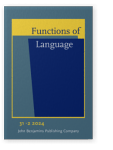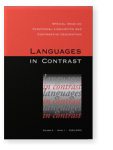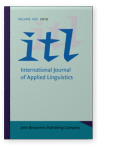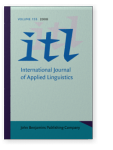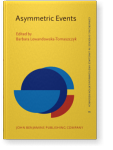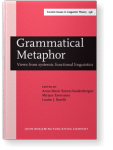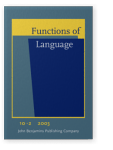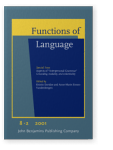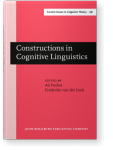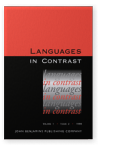Liesbet Heyvaert
List of John Benjamins publications for which Liesbet Heyvaert plays a role.
Journal
Titles
Explorations in English Historical Syntax
Edited by Hubert Cuyckens, Hendrik De Smet, Liesbet Heyvaert and Charlotte Maekelberghe
[Studies in Language Companion Series, 198] 2018. viii, 312 pp.
Subjects English linguistics | Germanic linguistics | Historical linguistics | Syntax
Functional Linguistics and Contrastive Description
Edited by Kristin Davidse and Liesbet Heyvaert
Special issue of Languages in Contrast 4:1 (2004) 199 pp.
Subjects Comparative linguistics | Functional linguistics | Theoretical linguistics
2018 Chapter 6. Category change in the English gerund: Tangled web or fine-tuned constructional network? Category Change from a Constructional Perspective, Van Goethem, Kristel, Muriel Norde, Evie Coussé and Gudrun Vanderbauwhede (eds.), pp. 149–177 | Chapter
This study considers the diachronic categorial shift from nominal (NG) to verbal gerunds (VG) in Middle English in terms of Langacker’s functional account of noun phrases and clauses as ‘deictic expressions’. The analysis shows that the Middle English gerund was essentially formally nominal but… read more
2015 Conjunctive structures in learner English: A qualitative analysis of hortatory expositions English Text Construction 8:2, pp. 236–264 | Article
In this paper we address the issue of conjunction use in learner writing from a text-structuring angle, focusing on hortatory expositions by NNS learners and NS professionals. The learners are advanced Dutch-speaking students of English, while the professionals are journalists writing for British… read more
2010 Review of Szawerna (2007): A Corpus-Based Study of Nominalizations Predicated by English Deverbal Nouns In -tion ITL - International Journal of Applied Linguistics 160, pp. 132–137 | Review
In A Corpus-Based Study of Nominalizations Predicated by English Deverbal Nouns in -tion, Michal Szawerna presents the results of his PhD research on -tion nominalizations. Szawerna’s approach is couched in the Cognitive Grammar framework as developed primarily by Langacker (1987 and 1991) and… read more
2008 Collex-Biz: A Corpus-Based Lexical Syllabus for Business English ITL - International Journal of Applied Linguistics 155, pp. 77–93 | Article
This paper reports on the development of Collex-Biz, a corpus-driven web-based learning platform for general economic English. The design of this platform was informed by a number of research-based principles, particularly frequency and collocation, which are insufficiently incorporated in… read more
2008 13. The periphrastic realization of participants in nominalizations: Semantic and discourse constraints Asymmetric Events, Lewandowska-Tomaszczyk, Barbara (ed.), pp. 245–259 | Article
This paper discusses the inclusion of periphrastic participants in deverbal nominalizations. While traditionally the clause-like properties of explicitly realized participants are focused on, it zooms in on deverbal event nominalizations that lack one or more participants and points to the… read more
2004 Introduction Functional Linguistics and Contrastive Description, Davidse, Kristin and Liesbet Heyvaert (eds.), pp. 1–12 | Miscellaneous
2003 Nominalization as grammatical metaphor: On the need for a radically systemic and metafunctional approach Grammatical Metaphor: Views from systemic functional linguistics, Simon-Vandenbergen, Anne-Marie, Miriam Taverniers and Louise J. Ravelli (eds.), pp. 65–99 | Article
2001 Nominalization as an ‘interpersonally-driven’ system Aspects of “Interpersonal Grammar”: Grounding, modality, and evidentiality, Davidse, Kristin and Anne-Marie Simon-Vandenbergen (eds.), pp. 283–324 | Article
This paper analyzes different types of deverbal -er nominals and factive nominalizations and argues that they can only be fully described and generalized across if, in addition to their ideational properties, the interpersonal categories which they realize are also considered. It is shown that… read more
2000 Gerundive Nominalization: From Type Specification to Grounded Instance Constructions in Cognitive Linguistics: Selected papers from the Fifth International Cognitive Linguistics Conference, Amsterdam, 1997, Foolen, Ad and Frederike van der Leek (eds.), pp. 103–122 | Article
1998 Non-agentive Deverbal -er Nominalization in English and Dutch: A Contrastive Analysis Languages in Contrast 1:2, pp. 211–243 | Article
This paper deals with non-agentive deverbal -er nominals in English and Dutch. It attempts to provide a grammatico-semantic explanation for the extension of agentive to non-agentive -er, and argues that the profile of the -er suffix, irrespective of whether it is agentive or non-agentive, is… read more
